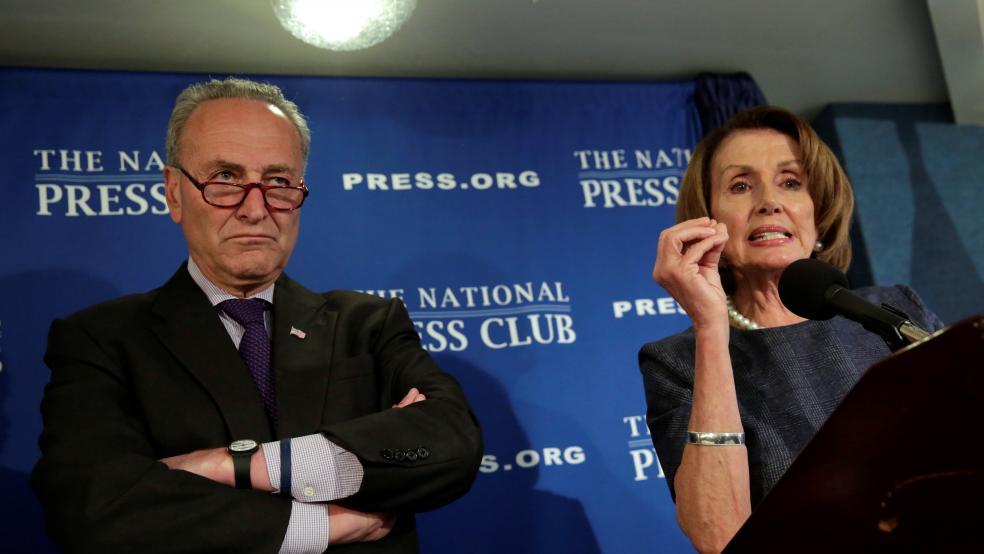There’s a strong argument among many Democrats that the party’s shocking 2016 electoral loss to Donald Trump and the Republican Party as a whole was at least in part due to a lazy messaging strategy that took the votes of the working class for granted. Now, 16 months from the next general election, the two top Democrats in Washington are promising that the party won’t make that mistake again.
On Monday, House Minority Leader Nancy Pelosi and Senate Minority Leader Chuck Schumer penned op-eds in The Washington Post and The New York Times, respectively, laying the foundation for a more populist-themed 2018 campaign meant to move beyond simple opposition to Trump and the GOP agenda by presenting a set of concrete policy goals of their own.
Related: Trump’s Go-To Strategy Remains: Undermining Our Institutions
In their joint message, meant to be hammered home by a public appearance on Monday in Berryville, Virginia, the congressional leaders borrowed liberally from the two men who gave the Democratic Party the most trouble in 2016: Trump and Vermont Sen. Bernie Sanders, whose insurgent challenge to Hillary Clinton threatened, for a while, to splinter the party.
Both Trump and Sanders tried to speak to Americans who felt they had been left out of the economic gains enjoyed by the wealthy over the past few decades. Trump spoke directly to “the forgotten man” and Sanders railed against a system “rigged” to favor the wealthy.
The two Democrats echoed both men in their op-eds Monday.
“What motivates us is that the costs of living keep rising, but families feel their incomes and wages aren’t keeping up,” Pelosi wrote. “Special interests are given special treatment, while hard-working Americans are ignored. Working people from the heartland to the cities are struggling in a rigged economy and a system stacked against them.”
Related: Six Ways Trump Is Trying to Make Sure Obamacare Fails
Schumer said that the Democratic Party itself is to blame, for watching as “government has gone along, tilting the economic playing field in favor of the wealthy and powerful while putting new burdens on the backs of hard-working Americans.”
Members of his party, Schumer continued, “have too often hesitated from taking on those misguided policies directly and unflinchingly — so much so that many Americans don’t know what we stand for. Not after today. Democrats will show the country that we’re the party on the side of working people.”
The two party leaders laid out the basics of a platform focused on three things: increasing worker pay, lowering the cost of living, and helping workers obtain the skills and certifications they need to compete in the modern economy.
They also offered what they said were the first of what they promised would be a series of proposals for getting there, stressing the idea that they are a continuation of existing Democratic initiatives.
“We’ve already proposed creating jobs with a $1 trillion infrastructure plan; increasing workers’ incomes by lifting the minimum wage to $15; and lowering household costs by providing paid family and sick leave,” Schumer wrote.
Related: Wondering Which Health Bill the Senate Will Vote On? Here’s Your Scorecard
Among the new proposals are a reduction in drug prices that the Democratic leaders say would result from a two-pronged approach. They would demand rules that prevent companies from buying up the rights to existing medication and driving prices dramatically higher in order to drive profit. In addition, they would take steps to allow Medicare and Medicaid to use their buying power to negotiate lower drug prices for Americans.
If the name of the Democrats’ new plan, “A Better Deal,” is meant to reach back and invoke Democratic hero Franklin Delano Roosevelt, the focus of the second promise made Tuesday evokes an even earlier era of progressivism in the U.S., the trust-busting efforts of Republican Teddy Roosevelt.
Democrats, Pelosi promised, would take a newly aggressive stand against big businesses, especially those that stifle competition through aggressive consolidation. The party, she said, would be “cracking down on the monopolies and big corporate mergers that harm consumers, workers and competition. We will demand that proposed mergers meet tough new standards to protect competition before approval, and will institute post-merger reviews to ensure that consolidated companies keep their promises to American consumers.”
Finally, they promised to create a tax incentive system for businesses to hire and train workers who may not currently possess the skills that companies need, but who could learn them on the job. In a pair of otherwise anti-corporate sounding pieces, the offer of tax incentives was the only element that could reasonable be construed as friendly to the business community.
Related: How GOP Tax Reform Could Affect Your Retirement Account
For Democrats, the question won’t be whether they can get any of these initiatives enacted as they move toward 2018. They can’t. The GOP controls all the levers of power in Washington, and won’t be taking its marching orders from Schumer and Pelosi.
Instead, the question will be whether the GOP can out-populist Trump, without looking as though they are simply jumping on the bandwagon that the Trump campaign left by the side of the road once he was inaugurated, and hoping they can ride it to a victory of their own.





